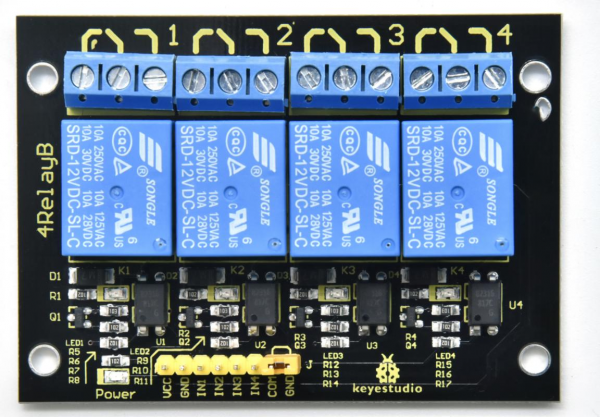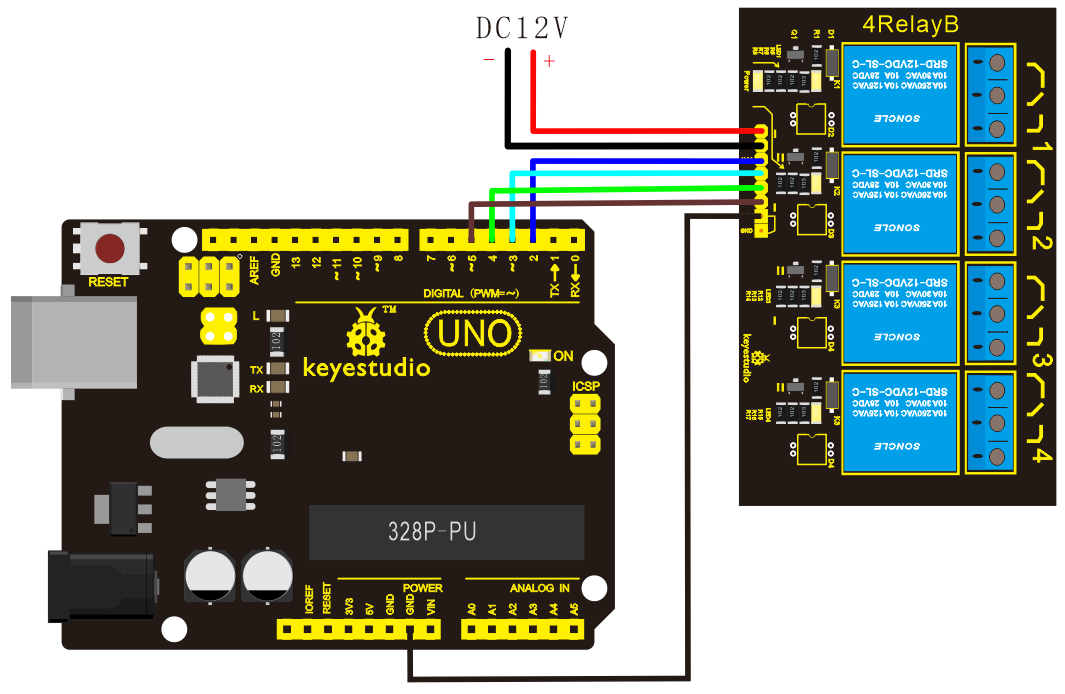TS2355 Duinotech Keyestudio 4-channel Relay Module: Difference between revisions
Jump to navigation
Jump to search
Keyestudio (talk | contribs) (Created blank page) |
Keyestudio (talk | contribs) No edit summary |
||
| Line 1: | Line 1: | ||
<br>[[File:Keyestudio 4-channel Relay Module.png|600px|right|frameless|]]<br> | |||
== '''Introduction''' == | |||
<br> | |||
keyestudio Relay Shield employs high quality relay with four channels input and output. | |||
<br><br> | |||
It can be connected to 250V/10A AC element or 24V/10A DC element to the maximum, therefore, it can be used to control lights, motors, etc. | |||
<br><br> | |||
The modularized design makes it easy to connect to Arduino expansion board. | |||
<br><br> | |||
The output state of the relay is shown by a LED for the convenience of actual application. | |||
<br><br> | |||
== '''Specification''' == | |||
<br> | |||
Control signal: TTL voltage | |||
<br><br> | |||
Active at HIGH level | |||
<br><br> | |||
Rated load: <br> | |||
* 10A 250VAC | |||
* 10A 125VAC | |||
* 10A 30DC | |||
* 10A 28VDC | |||
<br> | |||
Rated Through-current: 10A(NO) 5A(NC) | |||
<br><br> | |||
Max Switching Voltage: 250VAC 30VDC | |||
<br><br> | |||
Contact actuation time: ﹤10ms | |||
<br><br> | |||
Definition of module pins:<br> | |||
* i) Pin 1- Pin 4----Controlling end | |||
* ii) Power supply (DC12V) | |||
* iii) Ground (GND) | |||
<br><br> | |||
== '''Connection Diagram''' == | |||
<br>[[File:Keyestudio 4-channel Relay Module-connection diagram.png|1100px|frameless]]<br> | |||
<br> | |||
== '''Sample Code''' == | |||
<br> | |||
int BASE = 2 ; // I/O pin connected to the first relay | |||
int NUM = 4; //total number of all relays | |||
void setup(){ | |||
for (int i = BASE; i < BASE + NUM; i ++) { | |||
pinMode(i, OUTPUT); //set digital I/O pin as output | |||
} | |||
} | |||
void loop() { | |||
for (int i = BASE; i < BASE + NUM; i ++) { | |||
digitalWrite(i, LOW); //set digital I/O pin as ‘low’, i.e. turning off the relay gradually | |||
delay(200); //delay | |||
} | |||
for (int i = BASE; i < BASE + NUM; i ++) { | |||
digitalWrite(i, HIGH); // set digital I/O pin as ‘high’, i.e. turning on the relay gradually | |||
delay(200); //delay | |||
} | |||
} | |||
Revision as of 17:23, 21 December 2023
Introduction
keyestudio Relay Shield employs high quality relay with four channels input and output.
It can be connected to 250V/10A AC element or 24V/10A DC element to the maximum, therefore, it can be used to control lights, motors, etc.
The modularized design makes it easy to connect to Arduino expansion board.
The output state of the relay is shown by a LED for the convenience of actual application.
Specification
Control signal: TTL voltage
Active at HIGH level
Rated load:
- 10A 250VAC
- 10A 125VAC
- 10A 30DC
- 10A 28VDC
Rated Through-current: 10A(NO) 5A(NC)
Max Switching Voltage: 250VAC 30VDC
Contact actuation time: ﹤10ms
Definition of module pins:
- i) Pin 1- Pin 4----Controlling end
- ii) Power supply (DC12V)
- iii) Ground (GND)
Connection Diagram
Sample Code
int BASE = 2 ; // I/O pin connected to the first relay
int NUM = 4; //total number of all relays
void setup(){
for (int i = BASE; i < BASE + NUM; i ++) {
pinMode(i, OUTPUT); //set digital I/O pin as output
}
}
void loop() {
for (int i = BASE; i < BASE + NUM; i ++) {
digitalWrite(i, LOW); //set digital I/O pin as ‘low’, i.e. turning off the relay gradually
delay(200); //delay
}
for (int i = BASE; i < BASE + NUM; i ++) {
digitalWrite(i, HIGH); // set digital I/O pin as ‘high’, i.e. turning on the relay gradually
delay(200); //delay
}
}

